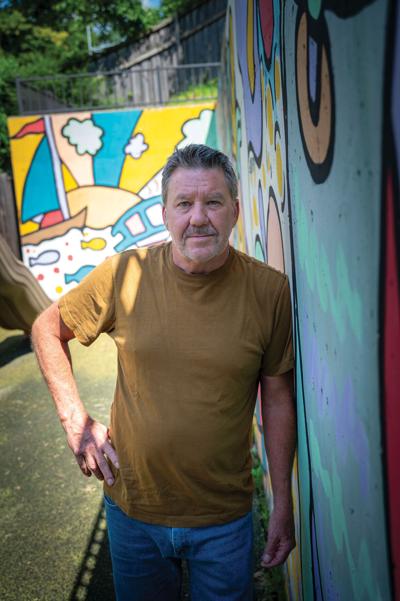
Robert, a client of Safe Haven
This article is from a two-part cover story on homeless outreach in Nashville. Read the rest here.
Robert thought he had secured his family a Nashville apartment, but when he arrived in town from Oklahoma, someone else was already living there. He had been scammed, he says.
And so Robert, his adult son, his teenage daughter and the family dog spent nine weeks living in a Dodge Durango until Robert was able to find some help. About 24 hours after reaching out to Safe Haven Family Shelter, Robert and his family had moved into a motel room. A few months later, they got an apartment. “It’s a two-bedroom, but we make it work,” says Robert. (Save Haven asked that the Scene use only his first name.)
Safe Haven has been helping families like Robert’s since 2003 — even longer if you count the legacies of the two shelters that merged to form the nonprofit, Safe Haven Shelter and the Nashville Family Shelter.
Safe Haven uses a rapid rehousing program to move families as quickly as possible into housing and then provide support and guidance in the months following their move-in date. After a family arrives at Safe Haven, the nonprofit finds room for them at a partnering motel or hotel while a case manager and a housing specialist work with them. The only requirement for Safe Haven’s help, says CEO Drew Freeman, is that the family includes a child.
While the goal of rapid rehousing is to secure a new home within 30 days, case manager Tory Ross notes that every client is different. “I’ve had people where it’s taken two weeks from the day we put them in a hotel to six months to get in an actual apartment or house,” she says. “It all depends on their income or their background, if they have any criminal charges, or different things like that.”
Once housing is located, Safe Haven helps with rental assistance for the first few months, and the case manager continues to work with the family for up to nine months to figure out what they need to stay in their new home.
“It could be money management, they may need to start working on budgeting,” says Ross. “They may need to find a new job. Maybe it’s mental health services they need to be connected to — it could be anything.”
Ross says the nonprofit even helps parents with their children’s birthdays, providing a gift and a birthday cake. Freeman adds that the nonprofit does this discreetly, so parents can take ownership of the celebration.
“We don’t ever want to come in as saviors,” Freeman says, adding that it’s important children see their parents, and not Safe Haven staff, as the reason for conditions improving.
Increasing household income is also part of the goal, especially with Nashville rents so much higher than they were before the pandemic.
“If you’re not making at least 20 bucks an hour right now, it’s very hard to make it,” says Robert. (To get specific, MIT’s living wage calculator says a single adult in Nashville needs to make $25 per hour to maintain a comfortable standard of living.) Robert’s main line of work is setting up trade shows, but it’s a seasonal job. He works part-time gigs and cuts down trees in the off months, and notes that the latter is getting tougher now that he’s 64.
Robert isn’t the only Safe Haven client trying to hold down work while maintaining housing. He even knows people from work who are going through similar struggles with homelessness. A 2021 study from the University of Chicago found that 53 percent of the sheltered homeless population had jobs, as did 40 percent of those unsheltered.
“A lot of the people you interact with in your daily life, you just never know which one of them are actually experiencing homelessness,” says Freeman. Ross adds that people tend to think of family homelessness as just a single mother, but the nonprofit has seen single fathers as well as grandparents raising children.
According to Metro’s Office of Homeless Services, there were 230 families, including 371 children, experiencing homelessness in March. A year prior, in March 2024, the OHS reported 359 unhoused families. Nationally, family homelessness saw a sharp rise from 2023 to 2024.
Last year Safe Haven served 262 families, including 603 children, and rehoused 100 families. About 40 percent of the households that come to Safe Haven are fleeing some form of domestic violence.
Federal funding cuts have hit the nonprofit — a story that’s echoed in industries including the arts and health care — and that’s reduced the number of families Safe Haven has been able to help in 2025. Freeman says Safe Haven also saw an influx of clients following the end of the national eviction moratorium in 2021, which had helped people remain in their homes during the height of the COVID-19 pandemic. On top of that, the supply of affordable homes remains inadequate. But Freeman is undaunted, and says community partners, including landlords, the Metro government and private businesses, remain vital to work Safe Haven does.
“It’s going to take all of those, including the federal funds, to live out our mission,” he says, “which is to end family homelessness.”
Hannah Herner contributed reporting.
Exploring the work of Metro's Office of Homeless Services and rapid rehousing nonprofit Safe Haven






